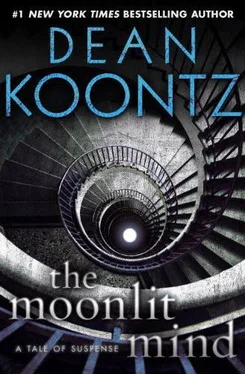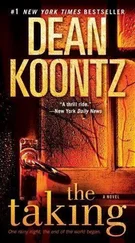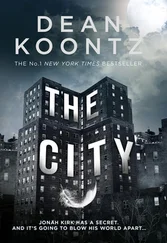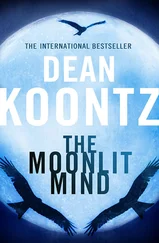During the fourteen months that she has lived mostly here, she has kept her tiny studio apartment as a mail drop and a place to do laundry. Her days off are Sunday and Monday, but she leaves the store only on the second of those days. Monday nights, she sleeps in her apartment, and she yearns to be once more in Broderick’s.
She has chosen this way of living not to save money on rent, but in the hope of finding again the security that she knew before her family was slaughtered. Life on the streets has toughened her, but it has not restored the sense of stability and permanence that she once enjoyed.
Perhaps even Broderick’s can’t give her back that most precious aspect of her childhood. But alone within its walls, she feels safer than she feels elsewhere. Except on those occasions when Crispin pays a visit, her only company is who she meets in books, as well as, in various clothing departments, a community of mannequins, none of whom can rob her of her virginity or kill her. She enjoys over 380,000 square feet of living space, surely the largest home in the world, and the longer she lives here without incident, the more easily she can make herself believe that this place is not merely a home but also a fortress.
The first time Crispin sneaked into Broderick’s with his dog, before closing time, he might not have made it safely through the morning without setting off an alarm or being caught on his way out. Thanks to Amity Onawa, he now knows how to come and go with almost as much stealth as the spirit of a nine-times-dead cat.
And now here they are, friends for almost a year, and except for Harley, each of them is the other’s only confidant.…
Over the final little cakes, Amity says, “I saw your mother at tea with some women about two weeks ago.”
“What — here?”
“At that table,” she says, pointing.
“I thought you worked in the kitchen.”
“Sometimes now, if a waitress drops out of a shift at the last minute, I take her tables.”
“What did you think of her?”
“She’s even more beautiful than her pictures. And very sure of herself.”
“Don’t ever serve her again,” Crispin warns. “Serving one of them in any way … well, it gives them a hook in you, I think. They can pull you into further and darker service as if you’re a fish on a line.”
“I don’t believe I’d be that easy. Anyway, I doubt I’ll ever have another chance to serve her. Certainly not soon. I overheard her tell the other women that she and your stepfather were jetting off to his home in Rio the next day for an extended stay.”
“No mention of her children, I suppose.”
“She said you, Harley, and Mirabell were doing well in boarding schools in London.”
“Jolly good,” Crispin says sourly.
“Will you ever confront her?”
“She’d kill me on sight.”
“Or you her.”
“I might.”
“And now that Theron Hall is empty?”
“A few staff will still be there, three or four.”
“But mostly empty,” Amity persists.
Crispin favors silence.
She reminds him: “You told me once that something happened there that you need to better understand. Something you need to go back and see again.”
“Not yet.”
“When?”
“When the cards tell me it’s safe.”
“Have you consulted them recently?”
“No.”
“Are you afraid?”
“Everyone should be afraid.”
After a long silence, Amity says, “There’s a cool display in the toy department. You’ve got to see it.”
As Amity slides out of the booth, Crispin says, “You mean now?”
“I didn’t know you had a busy schedule tonight.”
He gets up to follow her, and she points to the wall of tall windows. “Look. Snow. So beautiful.”
With the dog between them, they cross the room and stand at the huge panes of glass.
The first flakes are as large as silver dollars and look as soft as little pillows. The heavens shed their bedding on a city seeking sleep, crystalline goosedown spiraling through darkness, through the million feeble night-lights of a civilization always one dawn away from obliteration.
Crispin is nine and under the influence of a malign spell following Mirabell’s flight to Paris.…
Only much later will he think of himself as spellbound, but whether that is the truth of his condition or not, he passes August and September that year in a curious state of detachment, with little energy for a boy his age.
He reads books that he enjoys, but days later he can barely remember the stories.
He plays board games and card games with Harley, but he doesn’t care — or recall — who wins.
He sleeps a lot, daydreams when he isn’t sleeping, and finds himself some nights and afternoons in Harley’s room, sitting bedside, watching his brother sleep.
Mr. Mordred still homeschools them, but he teaches with less diligence than ever and requires of them no homework. Sometimes Crispin feels as if the tutor does not intend to educate them, only to maintain a pretense of education, that there is nothing for which they will need an education.
For a while, Harley continues to search for the three white cats, but by mid-August, he loses interest in that quest.
Crispin sees little of his mother, less of his stepfather. Those infrequent encounters support the exceedingly bizarre perception he has that Theron Hall is much larger than its official square footage and that it is growing bigger all the time.
He sees much of Nanny Sayo, both waking and in dreams. In the waking world, she is always affectionate toward him and respects her role as a surrogate parent. In dreams, she is usually the same as in real life, though now and then a sudden wildness overcomes her and she springs on him, tearing at his clothes and nipping at his throat without breaking the skin, all in such a way that frightens Crispin but also strangely excites him.
Sometimes the dream nanny looks exactly like the real woman. But at other times she will have one different feature: this time, the yellow eyes of a lizard; the next time, reptilian teeth or scaly hands with beautiful pearly claws.
Mirabell telephones again from Paris, once in late August and once in mid-September. She speaks with her mother, with Harley, with Nanny Sayo, and even with Mr. Mordred. The first time that she calls, Crispin is sleeping late, and no one thinks to wake him. On the second occasion, he is in bed with the mysterious fever that never lasts more than a day but that comes upon him every few weeks.
When eventually he flees Theron Hall, he will marvel that so many clues to the truth of that place and its denizens were offered to him without triggering his suspicion, let alone his alarm. If he was spellcast, it must have been a spell disabling his ability to make even obvious connections, to reason from evidence, and to hold in memory proofs of the conspiracy in the web of which he was caught.
Two days after Mirabell disappears, Crispin comes out of the miniature room and sees the matriarch, Jardena, crossing from the elevator to the door of her suite. She seems to be unaware of him, but he is struck by two things about her.
First, although she still wears one of her long dark dresses, she moves quickly and gracefully. Gone is the hesitant shuffle of an arthritic old woman.
Second, if her face was a withered apple before, it looks now, in the glimpse of it that he has, like a fresher fruit, the face of a woman fifty years old instead of a hundred.
Weeks later, near the end of August, as Crispin is staring out a window, daydreaming, a limousine pulls up to the front door of the house. The chauffeur assists from the car a pretty woman of perhaps thirty-five, wearing a tailored dark suit that flatters her figure. She oversees the unloading of many shopping bags and parcels from the trunk of the vehicle.
Читать дальше
Конец ознакомительного отрывка
Купить книгу










